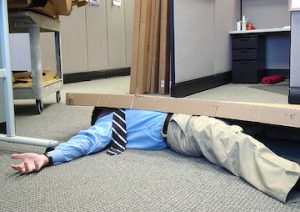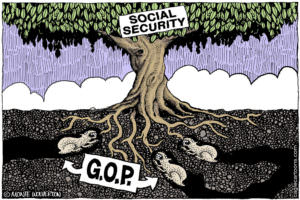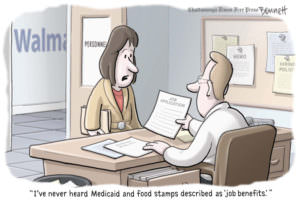Here Are Some of the Reasons It’s Messed Up to Make the Poor Prove They Deserve Government Aid
Legislators want to limit how citizens in need spend government benefits and force them to give up their privacy and freedom in the process. The Washington Post's Emily Badger explains why this is evidence of a blatant double standard.Legislators want to limit how citizens in need spend government benefits and force them to give up their privacy and freedom in the process. The Washington Post’s Emily Badger explains why this is evidence of a blatant double standard.
The Washington Post:
…we’ve now seen a raft of bills and proposed state laws to nudge [the poor] away from so much excess. Missouri wants to curtail what the poor eat with their food stamps (evidence of the problem from one state legislator: “I have seen people purchasing filet mignons”). Kansas wants to block welfare recipients from spending government money at strip clubs (in legalese: any “sexually oriented business or any retail establishment which provides adult-oriented entertainment in which performers disrobe or perform in an unclothed state for entertainment”)…Then there are the states that want to drug-test welfare recipients — the implication being that we worry the poor will convert their benefits directly into drugs.
Sometimes these laws are cast as protection for the poor, ensuring that aid is steered in ways that will help them the most. Other times they’re framed as protection for the taxpayer, who shouldn’t be asked to help people who will squander the money on vices anyway… Many, many Americans who do receive these other kinds of government benefits — farm subsidies, student loans, mortgage tax breaks — don’t recognize that, like the poor, they get something from government, too. That’s because government gives money directly to poor people, but it gives benefits to the rest of us in ways that allow us to tell ourselves that we get nothing from government at all.
Political scientist Suzanne Mettler has called this effect the “submerged state.” Food stamps and welfare checks are incredibly visible government benefits. The mortgage interest deduction, Medicare benefits and tuition tax breaks are not — they’re submerged. They come to us in round-about ways, through smaller tax bills (or larger refunds), through payments we don’t have to make to doctors (thanks to Medicare), or in tuition we don’t have to pay to universities (because the G.I. Bill does that for us)…Mettler raises a lot of concerns about what the submerged state means for how we understand the role of government. But one result of this reality is that we have even less tolerance for programs that help the poor: We begrudge them their housing vouchers, for instance, even though government spends about four times as much subsidizing housing for upper-income homeowners.
Read more here.
—Posted by Natasha Hakimi Zapata
Your support matters…Independent journalism is under threat and overshadowed by heavily funded mainstream media.
You can help level the playing field. Become a member.
Your tax-deductible contribution keeps us digging beneath the headlines to give you thought-provoking, investigative reporting and analysis that unearths what's really happening- without compromise.
Give today to support our courageous, independent journalists.






You need to be a supporter to comment.
There are currently no responses to this article.
Be the first to respond.